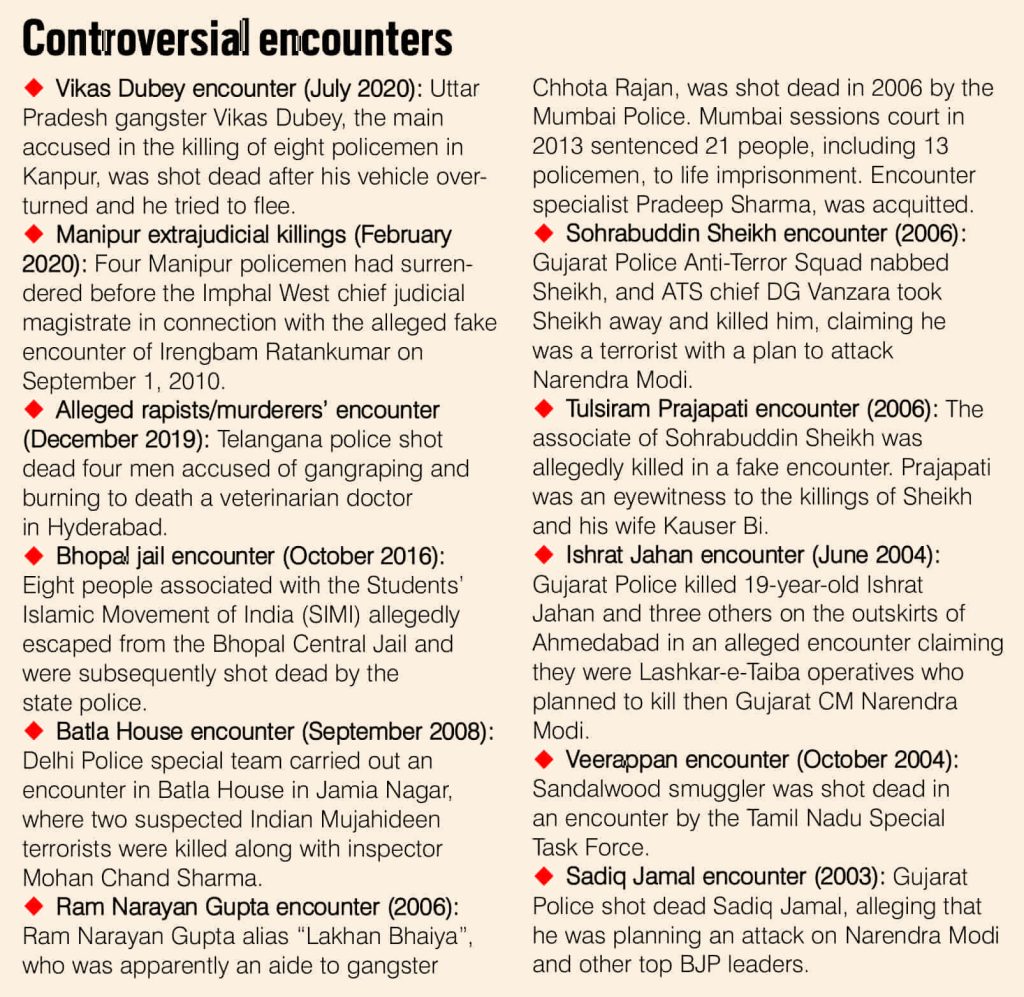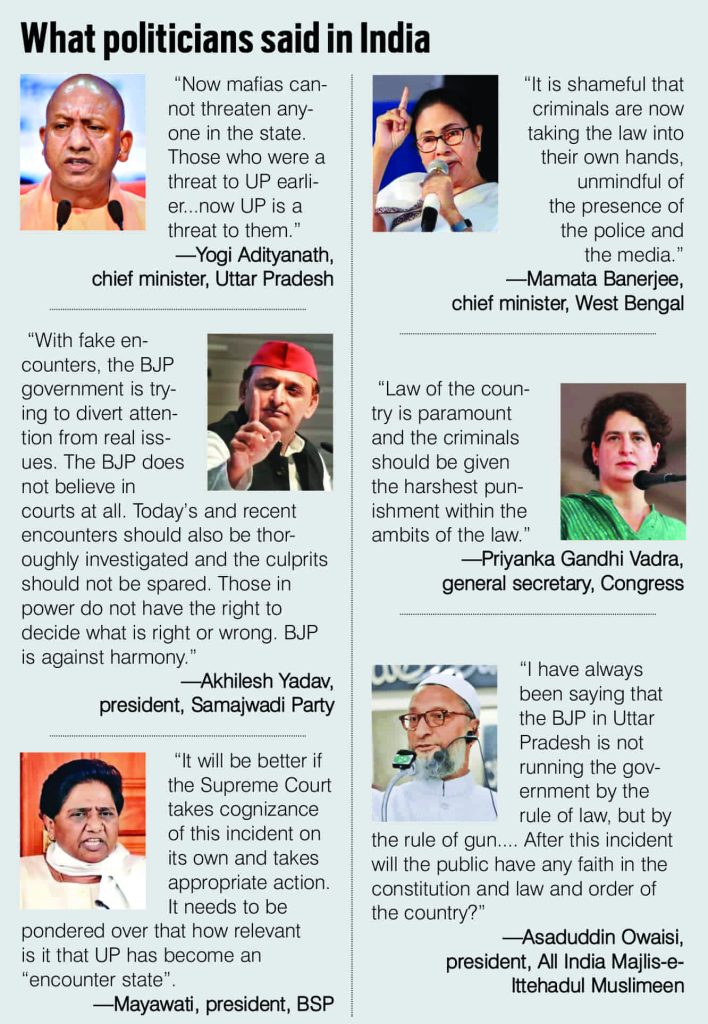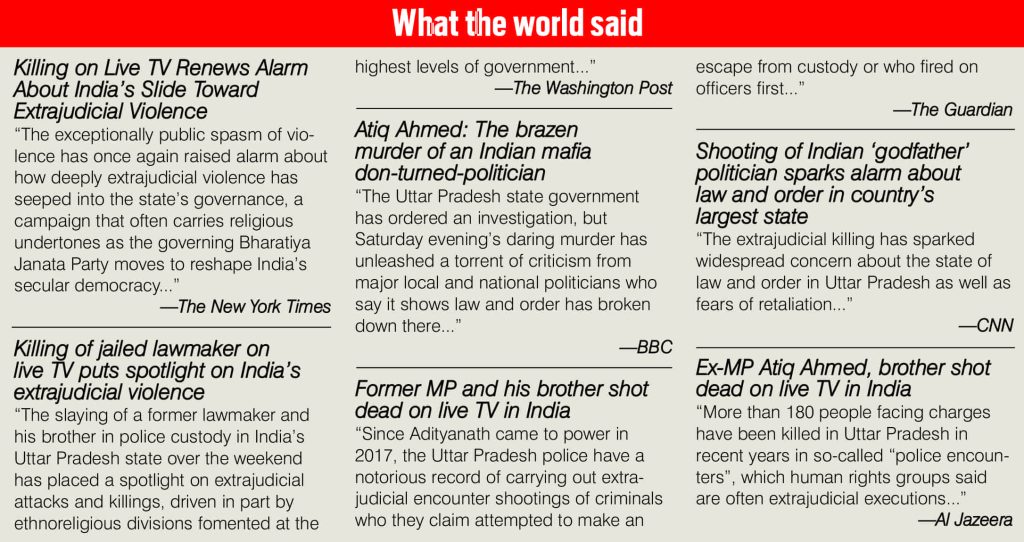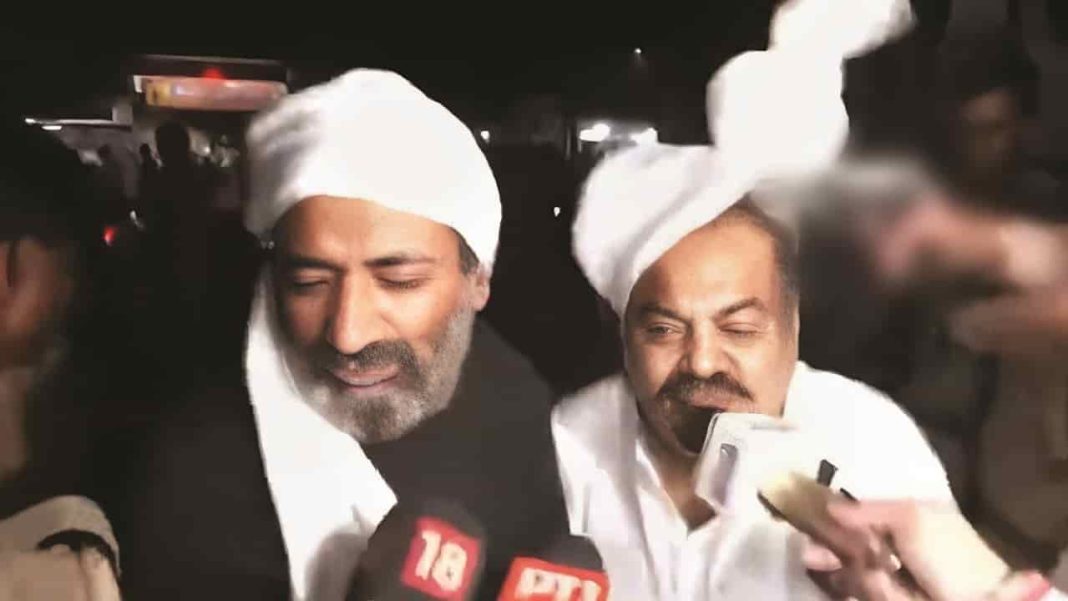By Sanjay Raman Sinha
It was a press interview like never before. As boom mikes reached out to catch every word of the dreaded mafia duo Atiq Ahmed-Ashraf, a spray of bullets from a sophisticated pistol riddled the skull of Atiq and the body of his brother Ashraf. The two died on the spot. It was a cold-blooded murder that took place in the presence of the Uttar Pradesh police force. The media was a witness and the gruesome murder was flashed live on national television. Atiq was a gangster-turned-Member of Parliament (MP) from Phulpur constituency in Uttar Pradesh. The shooters came posing as journalists.
As the duo arrived for a medical check-up at Calvin Hospital on Saturday (April 15) night, they were surrounded by other journalists who got close to Atiq and his brother. One of the assailants was posing as a cameraman. Another was holding a boom mike. The third was assisting them. The mafia brothers were in handcuffs and accompanied by police. As Atiq started to speak, one attacker aimed his pistol at Atiq’s head and fired at point-blank range. The bullet sheared his skull. Thereafter, both the brothers were mercilessly sprayed with bullets. All this happened at around 10 pm on April 15 in Prayagraj.
The killers were identified as Lavlesh Tiwari (22), Mohit alias Sunny Puraney (23) and Arun Kumar Maurya (18). The police said they recovered three fake media ID cards, a microphone and a camera from the assailants. The court had ordered a daily medical check-up for the gangster duo. Strangely on April 15, they were asked to get down at the hospital gate and made to walk to the hospital. It was here that they were brazenly shot dead.

An FIR has been registered under Section 3 of the Arms Act, Section 7 of the Arms Act, Section 25 of the Arms Act, Section 27 of the Arms Act, and Section 7 of the Criminal Law Amendment Act. The FIR states: “The three accused say that we wanted to wipe out the Atiq-Ashraf gang, so that we would have a name in the state” Atiq was accused in the murder of BSP MLA Raju Pal in 2005, as well as in the killing of Umesh Pal, a key witness in the BSP leader’s murder, in February this year.
After the killings, Section 144 of CrPC was imposed across Uttar Pradesh on Sunday (April 16), while security has been tightened at all prominent religious places across the state. A total of 22 police personnel have been suspended in the case so far.
To ensure an in-depth and impartial probe, Uttar Pradesh Chief Minister Yogi Adityanath constituted a three-member judicial commission. The commission has been formed under the chairmanship of retired judge of the Allahabad High Court, Arvind Kumar Tripathi. Former state DGP Subesh Kumar Singh and retired judge Brijesh Kumar Soni have also been included in the commission. The commission will present its report in two months. Meanwhile, the three accused were sent to judicial custody for 14 days, and thereafter to four days of police remand. Sunny Singh is a resident of Hamirpur, Lavlesh Tiwari is from Kotwali in Banda and Arun Maurya belongs to Kasganj.
Significantly, Sunny Singh has a connection with gangster Sundar Bhati, an infamous don of western Uttar Pradesh. He had developed close connections with Bhati during his stay in Hamirpur Jail. After his release from jail, Sunny started working for Bhati. The police suspect that Sunny got the Turkey-made Zigana pistol used in the murder of Atiq and Ashraf from Bhati.

There is a ban on this pistol in India and its cost is around Rs six to seven lakh. Possession of a high-end expensive pistol by a small-time criminal suggests a contract killing angle. A feared mafia don and MP, Atiq, till 2004, had 159 criminal charges in 36 separate criminal cases. He was lodged in a jail in Gujarat in 2019 under the National Security Act. His brother Ashraf was also a gangster and had several cases against him.
The killing of Atiq and Ashraf came days after their son and nephew Asad Ahmed was killed in an encounter with the police in Jhansi district on April 13. His aide Ghulam was also killed in the encounter. Interestingly, Asad was killed while hearing was in process on Atiq, who faced the charge of orchestrating the Raju Pal shootout. Atiq had been produced in Prayagraj Chief Judicial Magistrate’s court by the police as the key conspirator behind the killings of Umesh Pal and the two police gunners. As news broke of his son’s encounter death, Atiq, reportedly, broke down in the courtroom.
After the encounter, the Opposition was unsparing in its attack on the Uttar Pradesh chief minister. Samajwadi Party chief Akhilesh Yadav said in a tweet: “With fake encounters, the BJP government is trying to divert attention from real issues. The BJP does not believe in courts at all. Today’s and recent encounters should also be thoroughly investigated and the culprits should not be spared. Those in power do not have the right to decide what is right or wrong. BJP is against harmony.”
Reacting to the alleged encounter killing of Asad and Ghulam, Umesh Pal’s wife had said: “These two were among the shooters who killed my husband. Whatever Yogiji is doing and will do is accepted by me.”
Atiq’s wife Shaista Parveen is on the run and carries a reward of Rs 50,000. She faces charges of involvement in the murder conspiracy. Atiq’s two sons, Mohammad Umar and Ali are lodged in different jails in Uttar Pradesh in other criminal cases, while his two younger sons have been kept in a child protection home in Prayagraj by the police.
The Yogi Adityanath regime has an explicit anti-mafia policy and encounters are seen as an unofficial extension of this state policy. The Uttar Pradesh Police data shows that more than 10,900 police encounters have taken place in the state since March 2017, since Adityanath took over as the chief minister of Uttar Pradesh for the first time. “As many as 183 criminals have been gunned down in police encounters in the state since March 20, 2017,” Special Director General of Police (Law and Order) Prashant Kumar told PTI. However, Opposition parties have alleged that many of these encounters were “fake” and demanded an impartial probe. The Uttar Pradesh government and the police have denied these charges and have held that law and order has improved since the BJP came to power in 2017.

No law in India legitimizes encounter of criminals. A police officer has the legal right to injure or kill the criminal in self-defence or while maintaining peace and order. However, nothing must be done with any mala fide motive or to settle personal scores. With tacit support from the political establishment, fake encounters have become an unofficial credo of Indian police establishment. The dangerous trend started during the Punjab insurgency days and has continued thereafter.
Taking note of the seriousness of fake encounters on September 23, 2014, a bench of then CJI RM Lodha and Rohinton Fali Nariman issued 16-point guidelines to be followed for investigating police encounters. The guidelines came in the case People’s Union for Civil Liberties vs State of Maharashtra and include the registration of a First Information Report (FIR) as mandatory along with provisions for magisterial inquiry, keeping written records of intelligence inputs and independent investigation by CID or police team of another police station and videography and preservation of the post-mortem. A magisterial inquiry under Section 176 must invariably be held in all cases of death that occur in the course of police firing. Information about the incident must be sent to the NHRC or the state human rights Commission, as the case may be. Despite such clear guidelines, fake encounters have not been stemmed.
Days after the foul murder and encounter, the police is still trying to piece together the murder mystery. The police is now on the trail of Guddu Muslim, Sabir and Arman. Three days after Atiq Ahmed and his brother were shot dead, a letter of Shaista Parveen has surfaced which she had written to CM Yogi Adityanath. In the letter, she had maintained that senior cops under the orders of a minister were conspiring to kill Atiq and his brother under police custody. The letter was written before the shootout, but reached CM after the deaths.
Meanwhile, the Supreme Court has agreed to hear on April 24 a plea seeking an independent probe into the killing of Atiq and Ashraf. A bench headed by Chief Justice of India DY Chandrachud took note of the submissions in which urgent hearing was requested. The plea also sought an inquiry into the 183 encounters that have taken place in Uttar Pradesh since 2017.
Incidentally, two weeks before Atiq was shot dead while under police escort in Prayagraj, the Supreme Court had dismissed his plea seeking protection during his custody with the Uttar Pradesh Police in the Umesh Pal murder case. The bench of Justices Ajay Rastogi and Bela M Trivedi had granted him liberty to approach the Allahabad High Court for protection after he had claimed that his life was under threat while being in the custody of the Uttar Pradesh Police.

Atiq had sought protection, claiming that he and his family have been falsely “roped in” as accused in the Umesh Pal murder case in Prayagraj. Umesh Pal, a key witness in the 2005 killing of then Bahujan Samaj Party MLA Raju Pal, and his two security guards were killed in a shooting on February 24. According to Umesh Pal’s wife Jaya, in 2006, Atiq and his henchmen kidnapped her husband and forced him to give a statement in their favour in court.
It is reported that as a follow-up, the Yogi government has prepared a new plan to control crime in Uttar Pradesh. For this, a list of 61 mafias has been prepared. These are forest mafia, land mafia, sand mafia and recovery mafia.
During an event for signing of a Memorandum of Understanding (MoU) for setting up textile parks in Lucknow and Hardoi districts, the chief minister declared: “Before 2107, Uttar Pradesh was known for bad law and order. Today, there is no fear in any district. I assure that UP will work for the security of investors and will also give guarantee for the security of their money.”
Clearly, the Yogi government has clearly bulldozed the path of development in the state. However, as the police is given a free hand in encounter shootouts, fear of blatant human rights violation looms ominously. Further, in due course of the on-going probe if skeletons tumble out of the cupboard and police-gangster-politician nexus appear, it will pose another big challenge for the Adityanath government.


